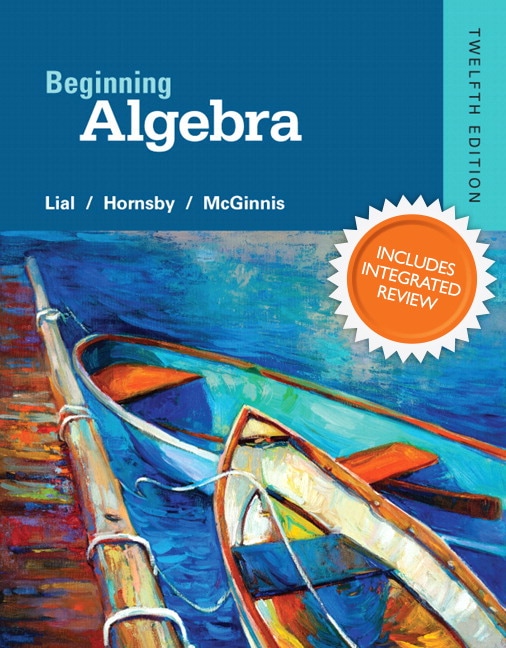
30.00$ - Purchase this E-book
Category : Higher Education
Note that the topics listed within each chapter below are objectives available in MyMathLab only, not in the textbook. For each of these objectives, there is just-in-time remediation in the form of videos, worksheets, practice, and assessment in the Integrated Review MyMathLab course only. R. Prealgebra Review R.1 Fractions R.2 Decimals and Percents 1. The Real Number System 1.1 Exponents, Order of Operations, and Inequality 1.2 Variables, Expressions, and Equations 1.3 Real Numbers and the Number Line 1.4 Adding and Subtracting Real Numbers 1.5 Multiplying and Dividing Real Numbers 1.7 Properties of Real Numbers 1.8 Simplifying Expressions 2. Linear Equations and Inequalities in One Variable 2.1 The Addition Property of Equality 2.2 The Multiplication Property of Equality 2.3 More on Solving Linear Equations 2.4 Applications of Linear Equations 2.5 Formulas and Additional Applications from Geometry 2.6 Ratio, Proportion, and Percent 2.7 Further Applications of Linear Inequalities 2.8 Solving Linear Inequalities 3. Linear Equations and Inequalities in Two Variables; Functions 3.1 Linear Equations and Rectangular Coordinates 3.2 Graphing Linear Equations in Two Variables 3.3 The Slope of a Line 3.4 Slope-Intercept Form of a Linear Equation 3.5 Point-Slope Form of a Linear Equation and Modeling 3.6 Graphing Linear Inequalities in Two Variables 3.7 Introduction to Functions 4. Systems of Linear Equations and Inequalities 5. Exponents and Polynomials 5.1 The Product Rule and Power Rules for Exponents 5.2 Integer Exponents and the Quotient Rule 5.3 Scientific Notation 5.4 Adding, Subtracting, and Graphing Polynomials 5.5 Multiplying Polynomials 5.6 Special Products 5.7 Dividing a Polynomials 6. Factoring and Applications 6.1 The Greatest Common Factor; Factoring by Grouping 6.2 Factoring Trinomials 6.3 More on Factoring Trinomials 6.4 Special Factoring Techniques 6.5 Solving Quadratic Equations Using the Zero-Factor Property 6.6 Applications of Quadratic Equations 7. Rational Expressions and Applications 7.1 The Fundamental Property of Rational Expressions 7.2 Multiplying and Dividing Rational Expressions 7.3 Least Common Denominators 7.4 Adding and Subtracting Rational Expressions 7.5 Complex Fractions 7.6 Solving Equations with Rational Expressions 7.7 Applications of Rational Expressions 7.8 Variation 8. Roots and Radicals 8.1 Evaluating Roots 8.2 Multiplying, Dividing, and Simplifying Radicals 8.3 Adding and Subtracting Radicals 8.4 Rationalizing the Denominator 8.5 More Simplifying and Operations with Radicals 8.6 Solving Equations with Radicals 9. Quadratic Equations 9.1 Solving Quadratic Equations by the Square Root Property 9.2 Solving Quadratic Equations by Completing the Square 9.3 Solving Quadratic Equations by the Quadratic Formula Table of Contents
Get Beginning Algebra Plus NEW Integrated Review MyLab Math and Worksheets--Access Card Package, 12th Edition by Margaret L. Lial, American River College John Hornsby, University of New Orleans Terry McGinnis


0 commentaires:
Enregistrer un commentaire